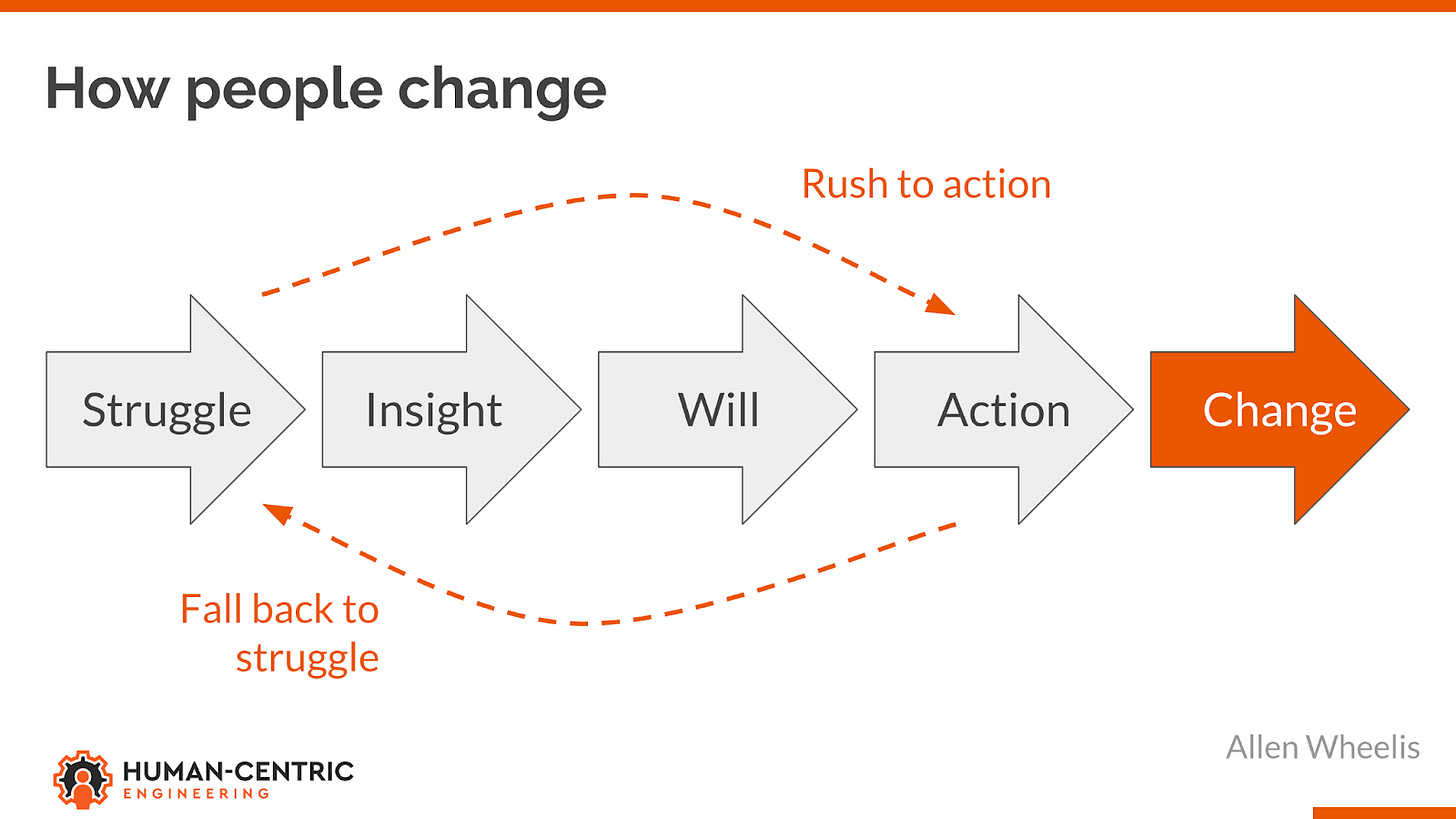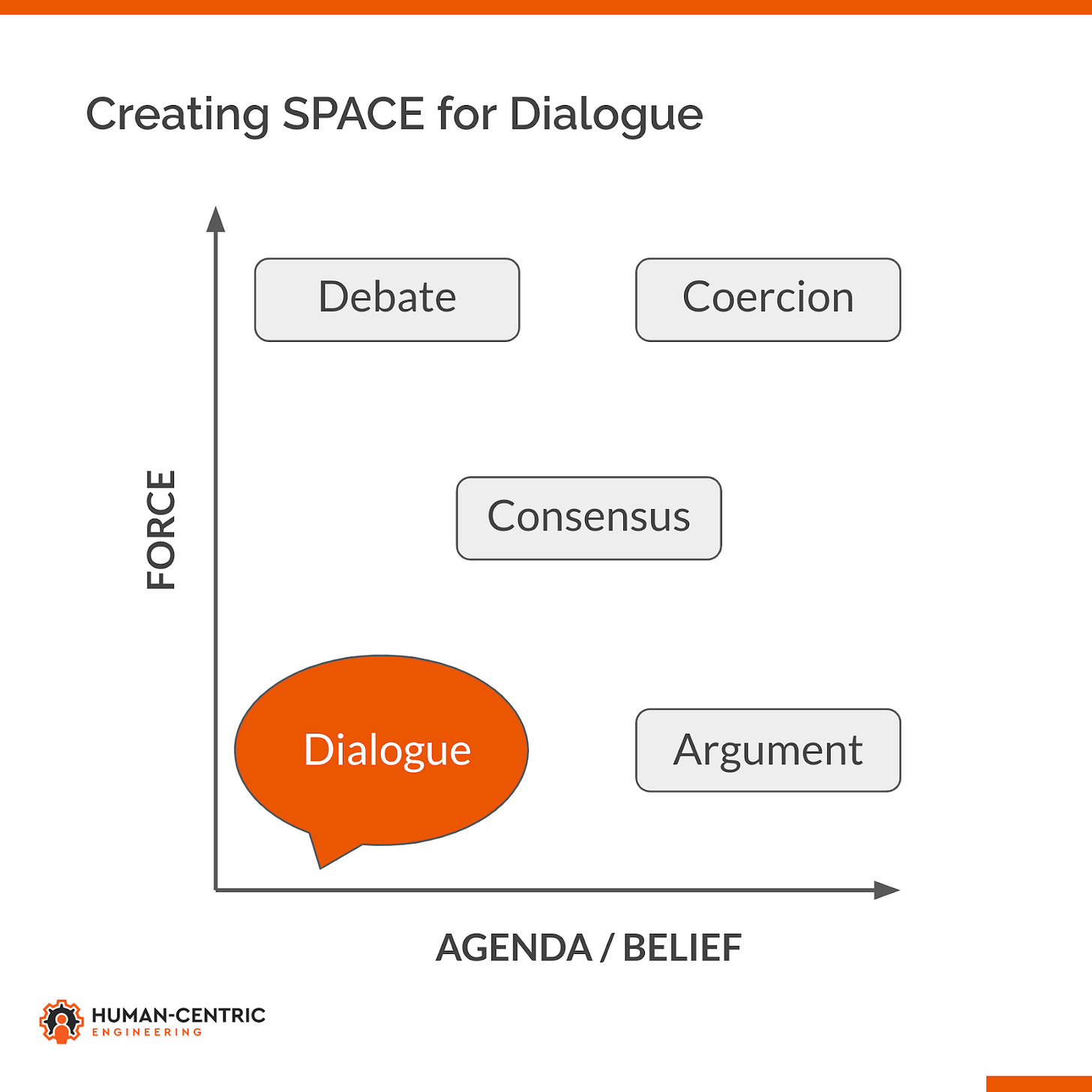From Struggle to Insight
Creating the conditions to make sense of what’s happening
Life is a series of struggles and overcoming struggles. No matter our privilege or poverty we will all have to work through struggles life throws at us. And it’s in the overcoming that we find growth.
People grow through struggle and overcoming, just as teams and organisations grow through struggle and overcoming. Struggle is the magical catalyst. We often avoid struggle and even feel ashamed when we’re struggling yet “the magic you are looking for is in the work you are avoiding”, as the saying goes.
Allen Wheelis, the author of How People Change, proposed a sequence that unfolds from struggle through to growth.
“We create ourselves. The sequence is suffering, insight, will, action, change.” - Allen Wheelis
As individuals, we’ll do anything to avoid suffering and cling to our old habits. In teams, and organisations we feel inclined to conform to the existing norms, putting up with suffering rather than rocking the boat. In organisations, where people are often judged on their performative ‘busyness’ we probably skip important steps in Wheelis’ sequence and go straight from ‘suffering’ to reactive ‘action’. Applying superficial sticky plasters over our wounds, skipping the learning opportunities of the ‘insight’ stage and the commitment of the ‘will’ stage, we miss out on meaningful ‘change’ and go straight back to the original ‘suffering’.
Insight
What takes us out of suffering is insight, and insight only comes from acknowledging the struggle and creating the SPACE to make sense of it rather than rushing to action. In our personal lives, this SPACE might come through a conversation with a friend, or time alone for self-reflection. SPACE to see different perspectives on our suffering, SPACE for insight and solutions to emerge in their own time.
In our working lives, SPACE tends to be harder to find. Back-to-back meetings, too much Work-in-Progress on our Jira board, the ever-present pressure to act ‘busy’ and seemingly productive. We therefore must be more intentional about creating SPACE at work.
This is how SPACE feels:
It feels uncomfortable to leave a big chunk of SPACE in the middle of an article. What if the reader gets bored and clicks away? Surely I need to fill the SPACE with words!
(actually, the substack editor wouldn’t let me leave the space I wanted to leave, but you’ll get the point.)
Creating and holding SPACE
Creating and holding SPACE at work for people and teams to reflect on their struggles and to allow for the emergence of insight feels really uncomfortable at work. We need action and results now! But for good decisions and sensible actions, we often need time to reflect - to see what’s happening - and that requires uncomfortable SPACE in which to do the uncomfortable work of understanding why we’re struggling. SPACE to be aware of how we are relating and responding to the struggle, and explore available options. We need this SPACE for insight but the convention for work meetings is to end with a list of actions, rather than a list of insights.
Creating SPACE at work is almost a courageous act of non-conformist rebellion. Even though we know that good decisions require context and that context requires insight. You can’t work out where to go next unless you know where you are now.
All decision frameworks begin by establishing where you are now. In Scrum it’s the ‘Standup’, the Balanced Scorecard begins with ‘Monitor Perspectives’, LEAN begins with ‘Value Stream Mapping’, and in the OODA Loop (Observe, Orient, Decide, Act) ‘Observe’ and ‘Orient’ require sufficient SPACE before Deciding and Acting. We need the SPACE to see where we are, and gain insight from struggle, before committing to action.
Team reflexivity
Creating and holding SPACE for reflection is a difficult and counterintuitive practice for teams under pressure to perform and deliver. There is, however, evidence to show the value of team reflection, or team reflexivity. An interesting study on team performance, by the Center for Evidence-Based Management (CEBMa), describes team reflexivity as ‘the extent to which members overtly reflect on the team’s goals, collaboration, decision-making processes, internal communications and so on’. Without this reflexivity, teams lose the positive effects of information-sharing, a shared memory system and cognitive consensus which the report suggests are predictive of team performance.
Team reflexivity requires honest reflection on team struggles, leaning into tensions with kindness and compassion. We need a ‘good faith’ dialogue to discover the insights leading to a shared commitment to action.
I explored the study and its findings a few weeks ago in the article below:
From discussion to dialogue
The etymology of words is often insightful. The word ‘discuss’ has Latin Roots: The term originates from the Latin verb discutere, which means "to dash to pieces, agitate, or shake apart." This is composed of:
Dis: meaning "apart"
Quatere: meaning "to shake" or "to strike"
The everyday use of the word has evolved from its Latin origins offering a useful contrast against the etymology of ‘dialogue’ which originates in the Ancient Greek word διάλογος (dialogos), which means "conversation" or "discourse." This is composed of two parts:
διά (dia): meaning "through" or "across"
λόγος (logos): meaning "word," "speech," or "reason"
Dialogue, through speech and reason, is appropriate to the insight-inducing SPACE we are exploring here. However, the norm for meetings is often closer to the “dash to pieces, agitate, or shake apart” nature of the original meaning of discussion. How often are meetings a display of egos, where contestants participants are battling it out to win? To come out on top either by dominating the conversation or appearing as the cleverest in the room. Would conversation not be better played as an ‘infinite game’, where the goal is to carry on the enjoyment of playing, rather than a ‘finite game’ to win? Competitive conversation puts people on the defensive, hardly the conditions for insightful reflection on struggles.
The SPACE we need for coming together for reflective insight is close to the idea of Bohmian Dialogue, an approach advocated by Physicist David Bohm, articulated in his book ‘On Dialogue’. This approach has become known as Bohmian Dialogue where we inhibit any desire to forcefully impose our agendas or beliefs.
Bohmian Dialogue
In Bohmian Dialogue the aim is to come together and find meaning. In Bohmian Dialogue nobody is trying to win. There is no attempt to gain points or to make your particular view prevail. In Bohmian Dialogue, everybody wins through insight. Talking and reflecting coherently as a unit as a result of a free flow of meaning. A Dialogue Group is participating in a pool of common meaning - collective thought. Participants are asked to suspend their assumptions and judgement, not arguing for how things ‘should’ be but for discovering shared meaning from how things are. Dialogue may arrive at the truth but is not directly concerned with truth. It is concerned with meaning. What meaning or insight can we derive through collectively reflecting on our struggles?
“Such communication can only lead to something new if people are able freely to listen to each other, without prejudice, and without trying to influence each other. Each has to be interested primarily in truth and coherence, so that he is ready to drop his old ideas and intentions, and he is ready to go on to something different, when this is called for.” - David Bohm, On Dialogue
In everyday life, we tend to identify with our opinions to varying degrees. Our egos are caught up in our beliefs and viewpoints. When someone challenges our viewpoint it feels like an existential threat, almost like a threat to our lives. To preserve our identity, our sense of self, our life, we can become defensive when our opinions are attacked. In Dialogue we are neither attacking other people’s views through forceful debate nor trying to impose our beliefs or ideology through argument, we cohere to find collective meaning and insight.
We are not used to dialogue. We rarely see dialogue modelled. When we watch how politicians talk along with pundits on both legacy and social media, we see an ever-widening polarisation. Blame, judgement, division and coercive communication styles leave us lost in the ‘meaning crisis’. If ever there was a time when SPACE for dialogue was needed, it is now.
Facilitating SPACE
At Human-Centric Engineering we spend time with engineers to give them the SPACE they need to reflect on their approach to work. We do this in a structured way with our Engineering Culture Index with supporting interviews and workshops. We can also take a less structured approach to provide support and workshops as needed to encourage team reflexivity. We’ll explore our struggles as individuals and teams to expose insights for action.
There are many examples of people who are great at creating SPACE. Your favourite long-form Podcast interviewer may well be a good example. Those interviewers whose approach creates the conditions for the interviewee to fully express themselves and their ideas. They make the SPACE for the other person to tap into their essence, and to find new aspects of themselves as they are being interviewed. This requires a style that is hard to put into words but one that you recognise when you see it. We see the transcending egos and listening with full curiosity to the interviewee’s perspectives.
I know two people who I consider quite masterful at creating SPACE.
with his Unhurried Conversations facilitates a group format where participants patiently take turns expressing whatever might be salient to them during the session as the group feeds each other's contributions to reveal slowly unfolding experiential insights. Another master of facilitation is with his Silent Conversations format, a conversation group where participants experience long periods of silence to reflect on a theme, before reporting back to the group their thoughts and experiences during the silence. These formats may seem unfamiliar and a little uncomfortable on one’s initial encounter with them, but both Mark and Johnnie are great at facilitating these formats because they know how to create and hold SPACE.As an aside, I’d like to interview them both together to see if there are styles and techniques they keep in mind when creating SPACE, and whether they see their approaches as teachable or something more innate to their characters. Perhaps a topic for a future article.
Insight through reflection, or trauma:
Suffering and struggle are a universal human experience, but it is in reflecting on the struggle, individually and collectively, that we find the insights for growth. In today’s ‘achievement society’ we may feel ashamed and embarrassed about admitting to our suffering and struggles, but the shame we feel from acknowledging our short-term suffering is far outweighed by the long-term shame we feel from not facing our suffering.
So I’m advocating for deliberate and intentional SPACE to reflect on our struggles. This may feel like a slow route to insight, decision and action. But if we don’t create that SPACE our individual and collective suffering may become repressed, where it festers and builds, suddenly erupting at a later date in chaos and confusion. Whether manifesting in a disruptive organisational shake-up or personal crisis, this process can be traumatic. Trauma can be a fast route to insight, a sudden revelation of the truth - "The wound and the eye are one and the same" as James Hillman said - our painful experiences shape our vision and understanding of life.
Suffering and struggle are the source of insight, which can emerge through deliberate and patient reflection or via sudden and painful trauma when patient reflection is skipped.
Whether we are reflecting as a team, or individually, facilitated by a third party or a manager, our insights will depend on our ability to create and hold SPACE for insight to emerge from struggle.






Insightful. Bohmian Dialogue gives a name to something I've tried to promote in the past with varying degrees of success or failure. Not sure what the typical european office is like these days but in the US we have such a culture of hurried decision making, oneupmanship, and "performance culture" that keeps everyone constantly on edge and in a state of permanent competition. One of the most common terms in a meeting context now is "disagree and commit" - in other words, hash it out for a few minutes but for goodness sake, hurry up and commit and silence the naysayers so we can all profit.
I've fallen foul of rushing in and attempting to create actions many times before, and it often never ends well. That space you talk about is so important, particularly on a personal level. Although not directly related, your post reminds me of some elements of the Chimp Paradox put forward by Prof. Steve Peters. Whether it's external struggles or our own internalised (and possibly irrational) thoughts, putting that space in place really does give us the time to digest things properly before seeking that all-important action.
P.S. I liked the etymology of the words, I always find it fascinating to learn where words originated. As a sidetrack, I follow this guy (https://robwords.com/) who has some cracking videos on the origins of all things English (amongst others).